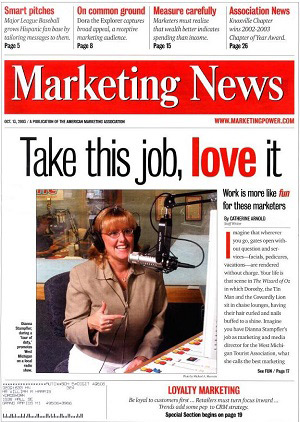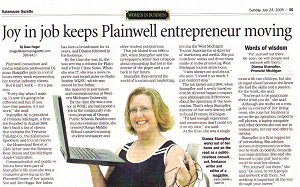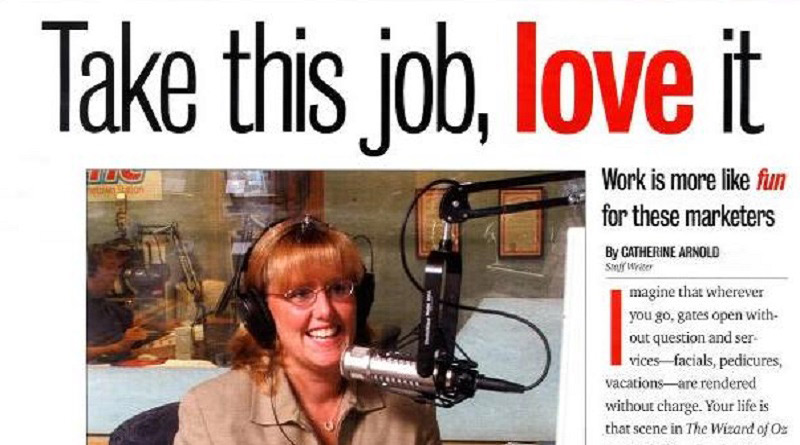PR is about relationships…plain and simple!
I was recently asked “what makes a PR person worth their weight in gold?” Having been active in this industry since 1991, I’ve seen a lot of changes in how things are done—but one thing holds true today, more than ever, PR is about relationships!
 The Public Relations Society of American defines PR as: “a strategic communication process that builds mutually beneficial relationships between organizations and their publics.” According to Wikipedia, “Most textbooks consider the establishment of the Publicity Bureau in 1900 to be the founding of the public relations (PR) profession. However, academics have found early forms of public influence and communications management in ancient civilizations.”
The Public Relations Society of American defines PR as: “a strategic communication process that builds mutually beneficial relationships between organizations and their publics.” According to Wikipedia, “Most textbooks consider the establishment of the Publicity Bureau in 1900 to be the founding of the public relations (PR) profession. However, academics have found early forms of public influence and communications management in ancient civilizations.”
To me, sales and marketing are more driven one-way toward dollars and numbers, while PR is more of a two-way street. It’s about connecting, networking and building solid relationships. Just like a friendship, a marriage, a business partnership—the best relationships are built on take AND give. Whether you’re focused on public relations, community relations, client relations or some other niche, it’s vital that you are seen as much for how you help others as they help you.
My forte is media relations. This means monitoring what my existing media contacts are writing about, commenting on their stories (and sharing them on social media, when appropriate), helping them secure interviews and brainstorming future story ideas. Becoming a goldmine of information and resources for the media will do wonders to build a solid foundation for a long-standing relationship.
 One of the advantage I have when it comes to working with the media is that I am also an active member of this society as well. I began writing professionally at the age of 16 and broadcasting at 17. I grew up in the industry, and know what reporters and now bloggers are looking for when it comes to facts, quotes, content and exclusive opportunities. And, I understand the immediacy of deadlines—which are amplified even more now in the world of instant-news online.
One of the advantage I have when it comes to working with the media is that I am also an active member of this society as well. I began writing professionally at the age of 16 and broadcasting at 17. I grew up in the industry, and know what reporters and now bloggers are looking for when it comes to facts, quotes, content and exclusive opportunities. And, I understand the immediacy of deadlines—which are amplified even more now in the world of instant-news online.
PR is a 24/7 job—365 days a year! If you can’t manage that pressure, you might want to reconsider your career choice. The media can’t and won’t wait for you to get back to them 24 hours later. They’ll find someone else to provide the information and will eventually stop relying on you as a source. You have to be available on their schedule. That may mean doing a phone-in radio interview in your pajamas at 4:30 am, staying up and going into the station at 10pm for the late news or sending photos over a busy holiday weekend. Excuses like “I took the weekend off,” or “We were busy at the store” don’t matter to the media source, what matters is that you sent them what they needed by their deadline (which is typically hours ago).
When I’m working with ShowSpan in Grand Rapids on the Michigan International Auto Show, Grand Rapids Boat Show and Grand Rapids International Wine, Beer & Food Festival, I know that I’m going to be up at 3:30 am and TV-ready by 4:45 am to fit with the networks’ broadcast schedules. Often, there is more than one network in the building at any given time, which means finishing up an interview with the Fox affiliate at 7:13 am and running (literally) to the other side of the show floor for a 7:15 am segment with the NBC network. When you’re able to pull that off, consistently—without missing a beat (or losing your breath), the media take note.
When a local radio station is scrambling for someone to talk about holiday traditions on Christmas morning or someone to come co-host on the Saturday of Memorial Weekend, they know I’ll make myself available via phone for the interview. My solid media contacts also know if they get a last-minute cancellation for an interview, they can contact me to either fill the spot myself or I can likely find them another qualified guest, within a matter of minutes or hours.
 One of the things that sets Promote Michigan apart from some other agencies in Michigan is the vast network of people I have at my disposal after 25 years in the PR industry. If a writer is looking for a hop grower, a true crime author, a fudge maker, a boat captain, a professional golfer, an equestrian historian, a chef, a snowshoe maker, whatever it may be—I either know someone, or know someone who knows someone. If you don’t have that vast rolodex, you better know how to utilize Google and other online resources to help the journalist get the information they need. In the context of Jerry McGuire, “Help them help you!”
One of the things that sets Promote Michigan apart from some other agencies in Michigan is the vast network of people I have at my disposal after 25 years in the PR industry. If a writer is looking for a hop grower, a true crime author, a fudge maker, a boat captain, a professional golfer, an equestrian historian, a chef, a snowshoe maker, whatever it may be—I either know someone, or know someone who knows someone. If you don’t have that vast rolodex, you better know how to utilize Google and other online resources to help the journalist get the information they need. In the context of Jerry McGuire, “Help them help you!”
It is also important to do what you say you’re going to do—on time (or sooner) and OVER deliver. It’s important that you’re reliable, responsible and consistent when working with the media. Nothing will turn off a writer or reporter more than you saying you’ll get them a photo, a quote or an interview and then you don’t follow through. Make a habit of such practices and you’ll quickly find yourself crossed off their source list.
It may seem like doing all of these things above weigh heavily in favor of the media source, but keep in mind—if you’re consistently producing for them in a quality, timely and consistent manner, they will be more likely to return the favor when you have a story that needs to be told. It’s like building up credit to be redeemed later.
According to Memorie Bailey in this November, 2012 Platform Magazine article “Building Relationships; Journalists and PR Professionals,” the relationship must be mutual. “A significant amount of the information journalists gather comes from PR professionals, so they need us just as much as we need them. All communication experts value relationships. Maintaining strong and functional relationships between PR practitioners and journalists will help accomplish the ultimate goal of both professionals, which is to disseminate meaningful messages to key publics.”
The International Public Relations Society has a great post online with “10 ways to build strong relationships with reporters and bloggers” that is worth the quick read.
Do you have other tips you’d like to add for forming and fostering relationships between PR professionals and the media?


